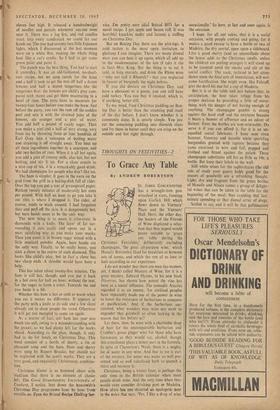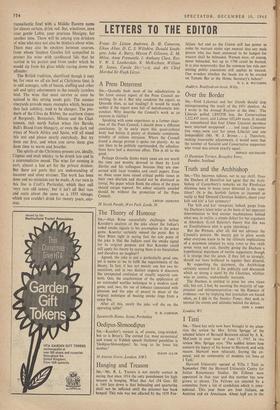THOUGHTS ON FESTIVITIES-2
To Grace Any Table
By ANDREW ROBERTSON
I do not wonder that there are men (no women, yet. I think) called Masters of Wine, for it is a great mystery. Edward Hyams, in his new book Dionysus, has shown how potent the vine has been as a social influence. The nomadic Asiatics regarded it as an enemy, 'for civilised peoples have repeatedly made use of the power in wine to lower the resistance of barbarians to conquest or pacification.' And if the barbarians suc- cumbed, what wonders may wine not work to engender that goodwill so often lacking in the season that lies before us?
Let there, then, be wine with a charitable drop of beer for the unconquerable barbarian and Crabbie's green ginger wine for those who have foresworn, as they would say, alcohol, though this constituent plays a minor part in the formula. In spite of Chesterton's Noah, there is a mighty lot of water in any wine. And that to me is part of the mystery, for never was water so well pre- sented and so well calculated both to quench a thirst and recreate it.
Christmas, being a winter feast, is perhaps the only time in the British calendar when most people drink wine. And the only time when they would even consider drinking port or Madeira. How often has one detected an apologetic note in the voice that says, 'Yes. I like a drop of wine occasionally.' So here, at last and once again, is the occasion.
I hope, for all our sakes, that it is a social occasion, with people coming and going, for it makes a good excuse to have a bottle or two of Madeira, the dry sercial, open upon a sideboard. Like a good sherry (and an amontillado about the house adds to the Christmas smells, unless the children are peeling oranges) it will stand up to be counted amid the smoke and stir of the social conflict. The cook, isolated in her atten- dance upon the final acts of immolation, will wel- come fortification. She might even, like Falstaff, give the devil his due for a cup of Madeira.
But it is at the table and just before that, in anticipation, the host takes refuge from his proper decision by providing a little of every- thing, with the danger of not having enough of anything. The champagne gambit is strong against the hard stuff and the mixtures because it bears a banner of affluence and an odour of flattery. Even the bottles are non-returnable. Do serve it if you can afford it, for it is an un- equalled social lubricant. I have seen even Saumur, Vouvray and humble white sparkling burgundies greeted with rapture because they came entwined in wire and foil, popped and frothed and fizzed against the palate. These champagne substitutes sell for as little as 14s. a bottle. But keep their labels to the wall.
Still white wines for the sophisticates (the old rule of study your guests holds good for the season of goodwill) are a refreshing thought. Light, dry and fragrant from the green bottles of Moselle and Alsace comes a group of delight- ful wines that can be taken to the table for the beginning of the meal, thus avoiding that last- minute upending or that dismal array of dregs. Settled to eat, and it will be that gallinageous
transatlantic fowl with a Middle Eastern name for almost certain, drink red. But, winelover, save your gentle Lafite, your precious Musigny, for another time. There will be among you drinkers of wine who may not also be thinkers about wine. There may also be smokers between courses, from whom Stephen Gaselee felt compelled to protect his wine with cardboard lids that he carried in his pocket and from under which he would sip from his glass while staring down the offender.
The British tradition, shortlived though it may be, for once we all ate beef at Christmas time, is to add sausages, rolls of bacon, stuffing and other salt and spicy adornments to the usually tasteless bird. The wine that must survive or even be noticed in this setting needs guts. The sunnier vineyards provide many examples which, because they lack subtlety, tend to be cheaper. The pro- ducts of the Cates du Rhone, the southern slopes of Burgundy, Beaujolais, Macon and the Chal- lonnais, rich north Italian wines like Barolo, Bull's Blood from Hungary, or even the dark red wines of North Africa and Spain, will all stand this test and please nearly everybody. But try them out first, and when you serve them give them time to warm and breathe.
The spirits of the Christmas present are, ideally, Cognac and malt whisky, to be drunk late and in a contemplative mood. The wine for evening is port, almost a lost art for the private drinker. But there are ports that are undemanding of decanter and silver strainer. The work has been done and no mistakes can be made. A star turn in this line is Croft's Particular, which they call 'very rare old tawny,' but it isn't all that rare and costs about the same as a 1955 vintage, which you couldn't drink for twenty years, any- way.







































 Previous page
Previous page